Beginner and experienced aquarists alike favor the guppy (Poecilia reticulata) for home aquariums.
The ultimate hardy fish, guppies, are easy to care for and tolerate a range of water conditions. They have long been prized for their mosquito eating prowess and beautiful color.
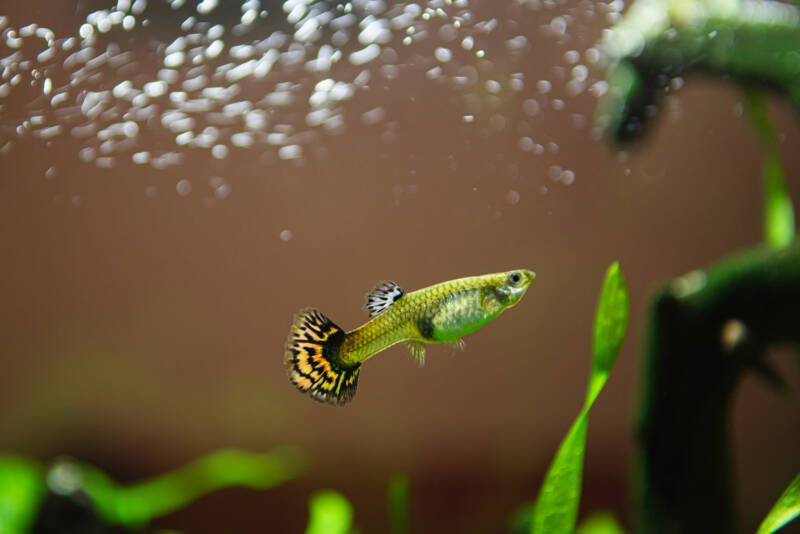
When setting up a guppy tank, you may be wondering: how long do guppies live?
The answer depends on several variables, most of which can be attributed to the quality of care you provide.
In this article, we will discuss the life expectancy of guppies and provide tips on how to maximize the lifespan of your fish.
[toc]
What is a Guppy’s Life Expectancy?
This question will always come back to the quality of the care you provide.
With proper water conditions and diet, you can expect your guppy to live anywhere from one to three years.
You may see a maximum of five years, but this is more the exception than the rule. Getting a healthy fish from a reputable breeder gives you a good start.
What Will Shorten Their Lifespan?
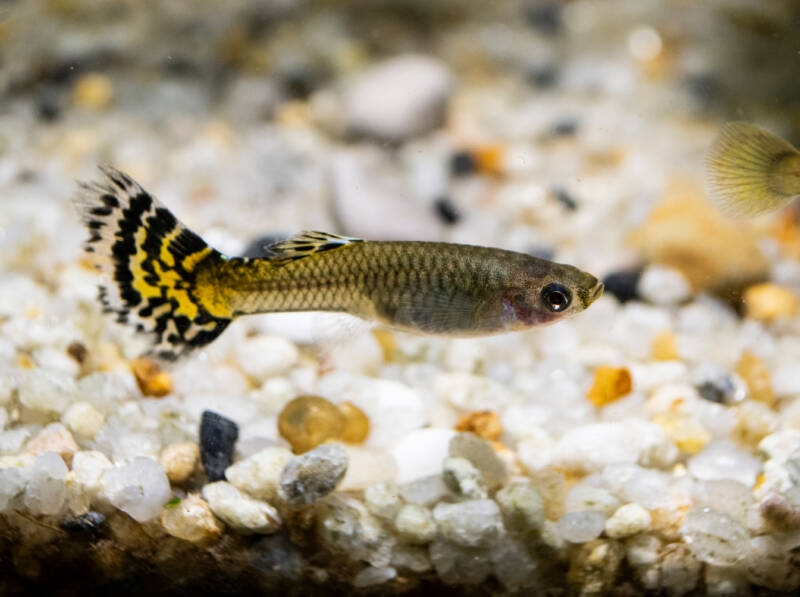
While guppies are hardy, tolerant fish, there are several things that can shorten their life expectancy.
Poor Water Conditions
Substandard and chronically poor water conditions are prime contributors to shortening the lifespan of any fish, guppies included.
These water parameter shifts can be sudden, such as a rapid temperature change, a shift in pH, or a spike of ammonia.
They can also be slower to occur, such as a buildup of nitrates, which in high amounts can sicken your fish.
The result can be the sudden death of fish or the slower degradation of their immune system, leaving them vulnerable to disease.
Stress
Stress is another significant contributor to lower life expectancy for guppies (or any fish, for that matter).
This stress can come from environmental factors, such as water conditions or tank setup.
It can also come from overcrowding, an improper ratio of male to female guppies, or from other aggressive fish species in the tank.
Pregnancy is another source of stress for female guppies, so take this into consideration if you plan to breed your fish.
Genetics
It is unfortunate, but sometimes a guppy with a shorter lifespan may simply have not been dealt the best genetic cards.
Talk to the breeder when purchasing your fish to ensure the best practices and genetic line possible.
Old Age
This seems like an obvious factor, but if you have a sudden, unexpected death of one of your guppies a few months after you purchase it, especially in the absence of any poor water conditions or obvious illness, you may have purchased an older guppy that was already nearing the end of its lifespan.
Again, buying fish from a good breeder is essential.
How Can You Extend Your Guppy’s Lifespan?
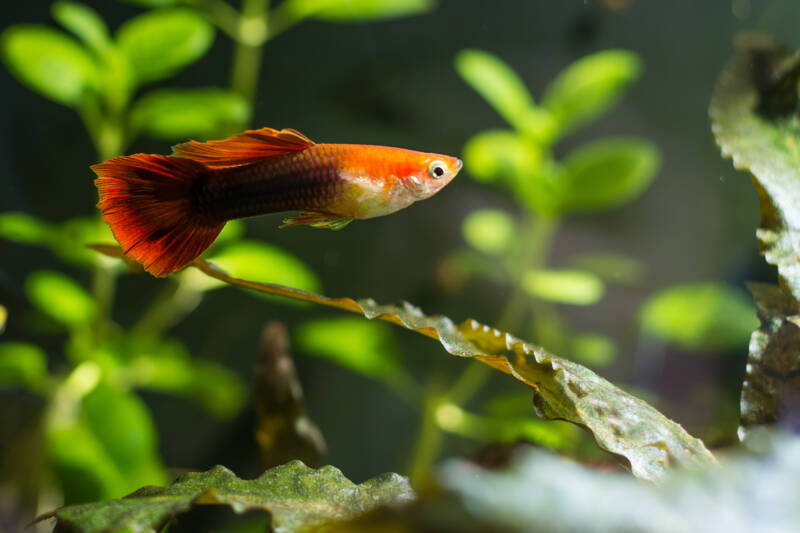
In general, guppies live longer when they are well cared for. With a little planning, you can set up the best environment and maximize the chance of your guppy reaching the upper end of their potential lifespan.
Start with the Right Tank Setup
First, get the tank size right. This goes a long way toward ensuring the health and happiness of your fish.
Guppies reach an adult length of between two to 2.5 inches (5-6.4 cm).
Their small size means they are great for smaller tanks, but they can also live in larger tanks when kept in a large shoal.
The minimum tank size for a shoal of three guppies is five gallons (20 l).
If you increase the number of fish in the shoal or add other species, you will need to increase the tank size accordingly.
A larger tank, around 10 gallons (40 l), will give them a bit more space to accommodate their active swimming behaviors.
Set Stable Water Parameters
Next, set the water conditions appropriately.
Because poor water conditions are the number one contributing factor in shortening your guppy’s lifespan, it is important to get these conditions within their tolerance range and keep them stable.
The following are ideal conditions for guppies:
- Water temperature: 72 to 82°F (22 to 28°C)
- pH: 6.8 to 7.8
- Hardness: 8 to 12 dGH
- Ammonia and nitrites: 0 ppm
- Nitrates: less than 10 ppm
Aim for the middle of these ranges, purchase a quality water testing kit, and test your water regularly.
Install a water heater, thermometer, and filter to help keep the water in top shape. Clean the tank and perform partial water changes weekly.
Add in Decorations and Plants
A pleasing and interesting tank environment means calmer, less stressed fish.
Lower stress levels lead to a more robust immune system, allowing your guppies to better fend off diseases with which they may come into contact.
For guppies, you have considerable flexibility in choosing how to adorn the tank.
Live plants are always an excellent addition to a guppy tank as they replicate the guppy’s lush natural habitat.
Plants of varying heights, such as guppy grass, java moss, Amazon sword, and hornwort, can create pleasing levels for your guppies to explore. Leave the middle of the tank open to allow them to swim.
Do not forget the hiding places. Guppies are prey in the wild and feel more comfortable with places to hide.
Give your guppies a quiet place to duck into from time to time using driftwood, rock structures, and even plastic decorations. Make sure any decorations are free from sharp edges that could harm your guppy’s delicate fins.
Always Keep Them in a Group
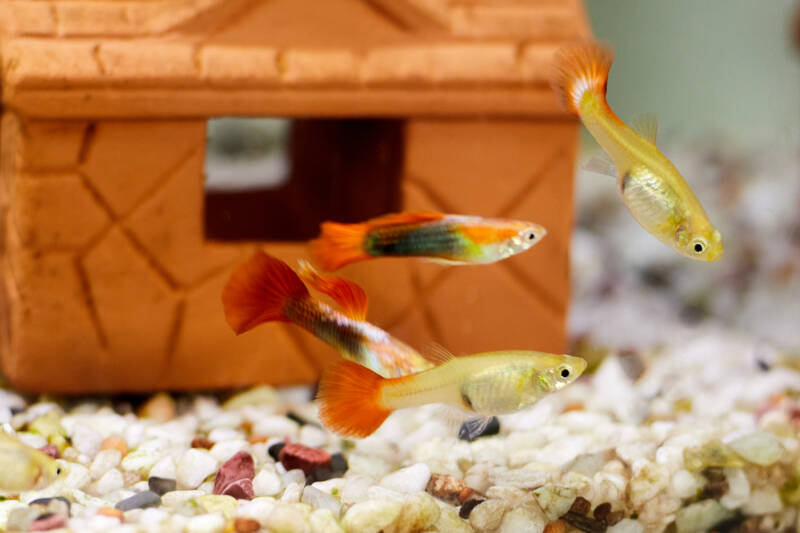
Your guppy is a social fish and needs more of its own kind to feel comfortable. Again, this helps to lower those stress levels and keep your fish healthy.
When kept in a shoal, your fish will be more active and confident.
The minimum group size for guppies is three fish: either three females or a single male with two females.
Keeping multiple male guppies in the same tank without enough females may result in aggression. Even so, they may still fight for dominance.
Be aware that guppies are prolific breeders, and keeping males with females may result in unwanted guppy fry. A group of all female fish is your best bet for a peaceful tank.
But Do Not Overstock
An easy rule of thumb is to keep one guppy per gallon of water. Any higher stocking densities will impact water conditions, raise stress levels, and reduce your guppy’s lifespan.
Feed Them a Quality Diet
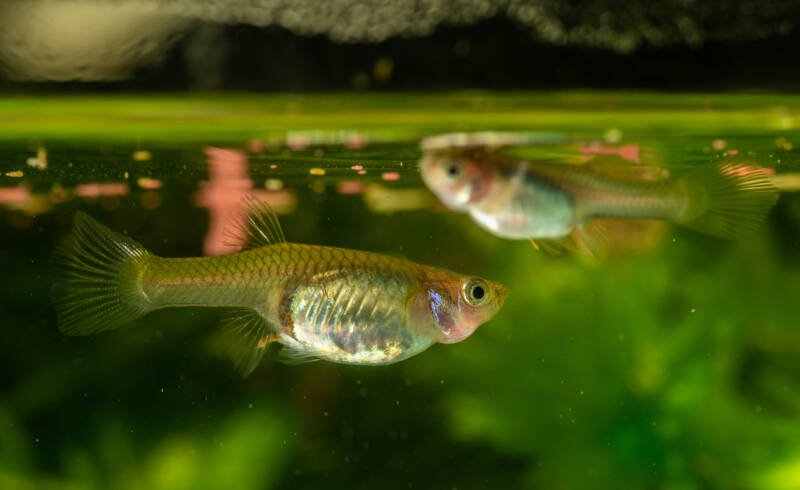
For the healthiest and longest life possible, guppies need a well-balanced variety of quality food.
The bulk of their nutrition should come from a quality flake or pellet food. Look for brands formulated for guppies to meet their nutrient needs and size.
In addition, your guppy will thrive when given live, frozen, or freeze-dried foods, such as:
- Daphnia
- Bloodworms
- Brine shrimp
- Vinegar eels
- Mosquito larvae.
A once or twice per week feeding of these foods is sufficient.
Omnivorous by nature, your guppies will even accept vegetables. Consider adding blanched zucchini, cucumber, boiled peas, lettuce, or veggie pellets into your rotation twice a week.
But Do Not Overfeed
Establish a feeding schedule for your guppies. Twice a day feedings of no more than they can consume in one to two minutes are perfect.
Your opportunistic guppies will overeat if given the chance, so sticking to a schedule is best for their health and longevity.
Overeating can lead to bloating or constipation, which can sicken your fish.
How Long Can Guppies Go without Food?
This species has a reputation for being able to go for a long time without food. In fact, guppies can survive up to two weeks without eating.
However, it should be obvious that this is an extreme case. Make sure your fish are eating on a regular schedule and do not fast them for more than three or four days.
Choose Tank Mates Carefully
Your active, social guppy will do well in a community tank with other similarly sized, peaceful-natured fish.
Consider the following species to pair with your guppy for the best odds of a happy tank:
Aggressive fish will increase stress and shorten your guppy’s lifespan. Avoid larger or aggressive fish, such as:
Keep Regular Lighting Cycles
Your guppy’s health relies in part on following their circadian rhythm. These fish are sensitive to periods of light and dark.
Light prompts swimming and eating, and periods of darkness let them rest.
Interrupting these cycles with too much or too little light can weaken your fish’s immune system.
Strive to mimic the natural day/night cycle, turning off aquarium lighting for at least six to eight hours each night. If you tend to forget to switch off the lights, install a timer.
Closing Thoughts
Ease of care is one of the primary reasons that guppies are so popular for home aquariums. The quality of care you provide can bolster the health of your fish and maximize their potential lifespan.
With attention to tank setup, water conditions, tank mates, and diet, your guppies will have the best odds of a long life.
We want to hear from you!
How long have your guppies lived, and what practice do you attribute to their longevity?
